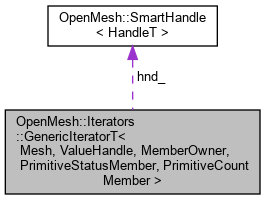|
|
typedef ValueHandle | value_handle |
| |
|
typedef value_handle | value_type |
| |
|
typedef std::bidirectional_iterator_tag | iterator_category |
| |
|
typedef std::ptrdiff_t | difference_type |
| |
|
typedef const Mesh * | mesh_ptr |
| |
|
typedef const Mesh & | mesh_ref |
| |
|
typedef const SmartHandle & | reference |
| |
|
typedef const SmartHandle * | pointer |
| |
|
|
decltype(make_smart(std::declval< ValueHandle >(), std::declval< Mesh >())) typedef | SmartHandle |
| |
◆ handle()
template<class Mesh , class ValueHandle , class MemberOwner , bool(MemberOwner::*)() const PrimitiveStatusMember, size_t(MemberOwner::*)() const PrimitiveCountMember>
Get the handle of the item the iterator refers to.
- Deprecated:
- This function clutters your code. Use dereferencing operators -> and * instead.
◆ operator value_handle()
template<class Mesh , class ValueHandle , class MemberOwner , bool(MemberOwner::*)() const PrimitiveStatusMember, size_t(MemberOwner::*)() const PrimitiveCountMember>
Cast to the handle of the item the iterator refers to.
- Deprecated:
- Implicit casts of iterators are unsafe. Use dereferencing operators -> and * instead.
The documentation for this class was generated from the following file:


